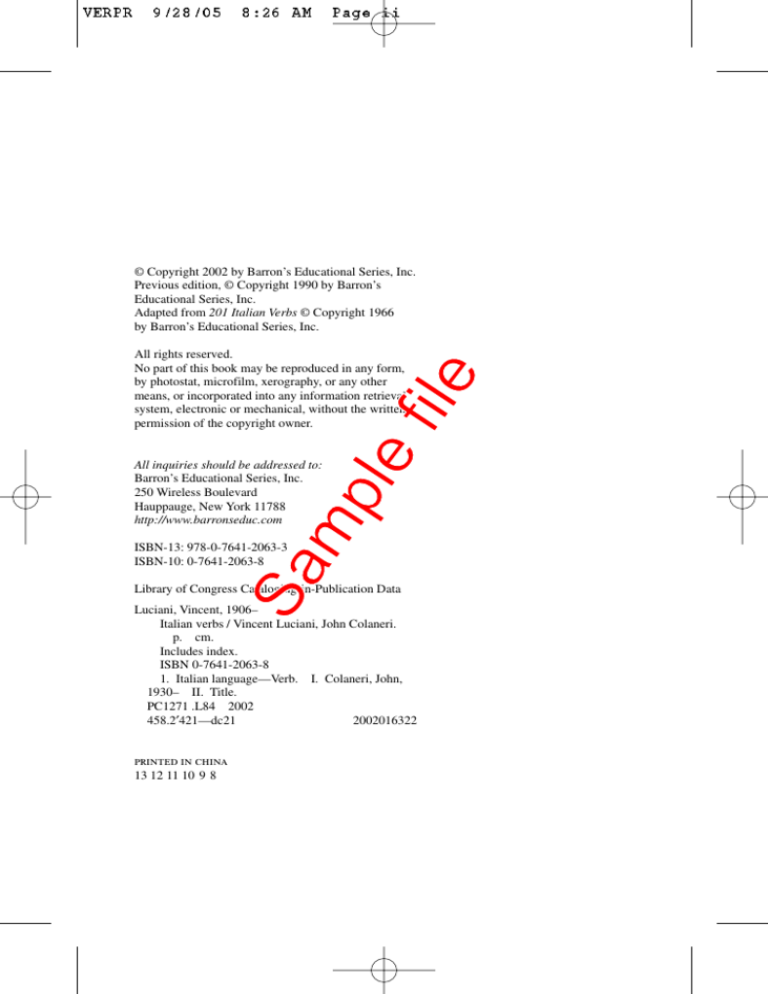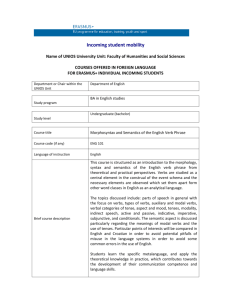
9/28/05
8:26 AM
Page ii
© Copyright 2002 by Barron’s Educational Series, Inc.
Previous edition, © Copyright 1990 by Barron’s
Educational Series, Inc.
Adapted from 201 Italian Verbs © Copyright 1966
by Barron’s Educational Series, Inc.
All inquiries should be addressed to:
Barron’s Educational Series, Inc.
250 Wireless Boulevard
Hauppauge, New York 11788
http://www.barronseduc.com
le
f
ile
All rights reserved.
No part of this book may be reproduced in any form,
by photostat, microfilm, xerography, or any other
means, or incorporated into any information retrieval
system, electronic or mechanical, without the written
permission of the copyright owner.
Sa
mp
VERPR
ISBN-13: 978-0-7641-2063-3
ISBN-10: 0-7641-2063-8
Library of Congress Cataloging-in-Publication Data
Luciani, Vincent, 1906–
Italian verbs / Vincent Luciani, John Colaneri.
p. cm.
Includes index.
ISBN 0-7641-2063-8
1. Italian language—Verb. I. Colaneri, John,
1930– II. Title.
PC1271 .L84 2002
458.2¢421—dc21
2002016322
printed in china
13 12 11 10 9 8
VERPR 4/15/02 2:17 PM Page iii
Contents
Foreword
iv
Accents
iv
General Rules
v
Verbs Conjugated with avere or èssere
v
vii
Compound Tenses
ix
Orthographical Changes
x
ile
Regular Conjugations
le
f
Verb Tenses
xi
xi
Subject Pronouns
xii
Sa
mp
Sample English Verb Conjugation
Italian Verbs Fully Conjugated in All the Tenses
Alphabetically Arranged
1
English-Italian Verb Index
302
Index of Irregular Verb Forms
307
Index of Over 1,000 Italian Verbs Conjugated Like the
Model Verbs
314
VERPR 4/15/02 2:17 PM Page iv
Foreword
Accents
Sa
mp
le
f
ile
Italian Verbs, a handy reference guide for students, businesspeople,
and travelers, presents the fully conjugated forms of over 300
commonly used Italian verbs.
The Verbs are arranged alphabetically, one to a page. On one single
page, you will find all verb forms in all tenses. The subject pronouns
have been omitted, as they usually are in conversation, in order to
emphasize the verb forms. Feminine forms of verbs conjugated with
èssere have also been omitted. The first three forms before the
semicolon are the first, second, and third persons of the singular. The
three forms after the semicolon are the plural forms.
At the bottom of each verb page, you will find sample sentences or
idiomatic expressions using forms of the verb.
The introduction includes an explanation of the accents used in the
book, general rules regarding irregular verbs, verbs conjugated with
avere or essere, models for three regular conjugations, orthographical
changes, Italian verb tenses with their English equivalents, a sample
English verb conjugation, and an explanation of Italian subject
pronouns.
The verb charts are followed by three indexes: an English-Italian
verb index, one of irregular verb forms with corresponding infinitives
given, and one with over 1,000 verbs conjugated like the model verbs
contained in this book.
This book should be helpful to learners of Italian at all levels.
John Colaneri
Italian has seven vowels, a, i, u, open e and o, close e and o. As a
rule Italian words bear no accent except on the final vowel. In many
contemporary editions an acute accent, (´), is used on final i, u, and
close e, and a grave accent, (`), is used on final a, o, and open e. In
this text words stressed on the antepenult bear an acute accent on the
vowel of that syllable when it is i, u, close e, and close o, a grave
accent when it is a, open e, and open o. Words stressed on the penult
bear a grave accent on the vowel of that syllable if it is an open e or
open o (if there is none, the e’s and o’s are close). No accent is used in
other cases unless the penult is followed by an unstressed io. We have
adhered to Florentine instead of Roman usage.
iv
VERPR 4/15/02 2:17 PM Page v
General Rules
ile
Except for dare, èssere, and stare, the Past Absolute of irregular verbs
is only irregular in the first and third person singular and the third
person plural. The other forms are regular, but one must note that
bere, condurre, dire, fare, porre, trarre and their compounds are
based, except for the Future and the Present Conditional, on the old
infinitives bevere, conducere, dicere, facere, ponere, and traere. If one
bears this in mind (along with the reservation for dare, èssere, and
stare), the Imperfect Indicative and Subjunctive are regular. The
endings for the Future and the Present Conditional are always the
same, in both regular and irregular verbs. Very often the first person
singular and the third person plural of the Present Indicative have the
same stem, which forms the first, second, third person singular and
the third person plural of the Present Subjunctive.
le
f
Verbs Conjugated with Avere or Essere
Sa
mp
1. Italian verbs are conjugated with avere to form the compound
tenses when they are transitive (that is, when they have a direct
object).
2. Reflexive verbs, such as alzarsi, are conjugated with èssere.
3. Impersonal verbs are conjugated with èssere, but fare is conjugated
with avere, and the verbs denoting atmospheric conditions may be
conjugated with avere: for example, è nevicato, ha nevicato.
4. Some verbs—for instance, córrere, saltare, and volare—are
conjugated with avere when referring to an action and with èssere
when referring to the goal of the action.
5. Some verbs, such as cominciare, durare, and finire, take avere
when an object is expressed or implied and èssere when used
passively with no object.
6. Some verbs, like mancare, have a different meaning according to
which auxiliary is used, avere or èssere. Ha mancato means he
failed, or he lacked; è mancato means he missed, or he was not
present.
7. Some verbs, like appartenere, dolere, and vívere, are used
indifferently with avere or èssere when they have no object.
8. Some verbs of motion, or limit of motion, as well as others are
commonly conjugated with èssere. Here is a list of the most
common of such verbs:
v
VERPR 4/15/02 2:17 PM Page vi
le
f
ile
to go
to appear
to arrive
to fall
to happen (both pers. and impers.)
to appear
to cost
to grow
to depend
to displease, to regret
to become
to emerge
to enter
to exist
to be
to flee
to arrive
to mount
to die
to be born
to appear, to seem
to leave
to perish
to please, to like
to remain, to stay
to be sorry, to regret
to go or come back, to return
to succeed, to go or come out again
to go or come up
to escape
to go or come down
to disappear
to burst, to “croak”
to rise
to disappear
to stay
to succeed, to come after
to go or come out
to come
Sa
mp
andare
apparire
arrivare
cadere
capitare
comparire
costare
créscere
dipèndere
dispiacere
divenire (diventare)
emèrgere
entrare
esístere
èssere
fuggire
giúngere
montare
morire
nàscere
parere
partire
perire
piacere
restare (rimanere)
rincréscere
ritornare (tornare)
riuscire
salire
scappare
scéndere
scomparire
scoppiare
sórgere
sparire
stare
succèdere
uscire
venire (and most of
its compounds)
vi
VERPR 4/15/02 2:17 PM Page vii
Regular Conjugations
Regular verbs are divided into three conjugations, according to
whether the present infinitive ends in -are, -ere, or -ire. The -ire verbs,
moreover, are of two types: those few in which the endings are added
directly to the stem (they are avvertire, bollire, convertire, cucire,
divertirsi, dormire, fuggire, partire, pentirsi, seguire, sentire, servire,
vestire, as well as the irregular aprire, coprire, offrire, scoprire,
soffrire) and those (most of them) that insert an -isc between the stem
and the ending in the first, second, and third person singular and
third person plural forms of the present indicative, imperative, and
subjunctive tenses. There are no principal parts in Italian. The verbs
of the three conjugations (for the third we use an -isc verb) are
inflected in the same way as the following models:
II
crédere
avere creduto
credènte
creduto
credèndo
avèndo creduto
cred—
le
f
ile
I
portare
avere portato
portante
portato
portando
avendo portato
port—
Sa
mp
Infinitive:
Past Infinitive:
Present Participle:
Past Participle:
Gerund:
Past Gerund:
Stem:
III
finire
avere finito
finènte (rare)
finito
finèndo
avèndo finito
fin—
Indicative Mood
Present:
pòrto
pòrti
pòrta
portiamo
portate
pòrtano
credo
credi
crede
crediamo
credete
crédono
finisco
finisci
finisce
finiamo
finite
finíscono
Imperfect:
portavo
portavi
portava
portavamo
portavate
poràvano
credevo
credevi
credeva
credevamo
credevate
credévano
finivo
finivi
finiva
finivamo
finivate
finívano
Past Absolute:
portai
portasti
credei
credesti
finii
finisti
vii







